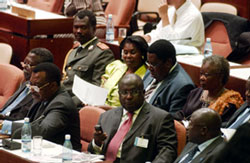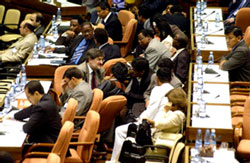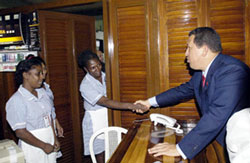- Non-Aligned Movement 14th Summit Conference – Havana, Cuba 2006 (Official Site)
- Non-Aligned nations continue to resist domination (FCN, 10-04-2006)
- Africa – Venezuela: Weaving New Alliances with Cultural Threads (FCN, 10-29-2005)

HAVANA (FinalCall.com) – When the Non-Aligned Movement (NAM) was born out of the Bandung Conference of five Afro-Asian leaders held in Indonesia in 1955, the French had recently been defeated in Vietnam, Venezuela and Bolivia were ruled by pro-American puppets, there was no Palestinian Authority, and Cuba was ruled by the pro-American dictator Fulgecencio Batista.

In 2006, the movement has grown to 118 members and a dozen official observers. Vietnam has been free and reunited for three decades; Venezuela and Bolivia are led for the first time in their history by Indigenous leaders; the Palestinian issue is dominant on the world stage; the revolutionary leadership of Cuba has resumed the chair of NAM; and even the United Nations has been led for a decade by an African, Secretary-General Kofi Annan.
“I stand before you a proud son of one of our founding nations,” Mr. Annan told the opening summit plenary on Sept. 15. “Half a century ago, when Kwame Nkrumah and his peers built the foundations of this movement, they could not have imagined the upheavals and advances that were to shape our world–and the crucial role our countries were to play in it.”
Before speaking at the summit, Mr. Annan met with ailing Cuban President Fidel Castro, who temporarily relinquished government power on July 31 when he underwent delicate intestinal surgery. “I can assure you that his health is improving very well,” Mr. Annan told the delegates, praising Pres. Castro “for his immense contribution and the leadership that he has shown over the different stages of the evolution of the movement.”
More than 50 heads of state and government or prime ministers–from U.S. adversaries Iran, Venezuela and Zimbabwe, to U.S. allies Ghana, India, Pakistan and South Africa–assembled in this tropical capital beginning Sept. 11, for the 14th Summit of the Non-Aligned Movement (NAM). The summit was aimed at reasserting the influence of developing countries in a world dominated by a single western superpower, rather than competing East-West political poles. Even Vice President Tariq Ahmed Bakr Al Hashimi from U.S.-occupied Iraq was in attendance.

“Our stand must be of moderation, harmony, tolerance and reasons,” Indian Prime Minister Manmohan Singh stressed in his remarks.
The developing countries that make up the overwhelming majority of the NAM membership discussed the problems faced by landlocked nations, the plight of the Palestinian people and the defense of the territorial integrity of all countries.
“Our small states now live in fear, as daily threats now emanate from the West to attack or undermine our systems in order to bring about regime change,” President Robert Mugabe of Zimbabwe told the assembly. “Democracy has now become, in the minds of (some), the right of a superpower to change governments. My country has rejected this stupid, belligerent notion, and will resist any attempt to realize it.”
Iranian President Mahmud Ahmadinejad sounded a similar theme. “Some states want to prevent the development of our countries so that we remain dependent on them and so that they can constantly keep putting pressure on us,” he remarked.
The summit also reviewed what it described as the “grave situation in the Occupied Palestinian Territory, including East Jerusalem” and in its final declaration, the summit reflected the stated goal to “strongly support the Palestinian people and their leadership and for promoting a revival of the peace process towards the achievement of a comprehensive, just and lasting peace settlement and the exercise by the Palestinian people of their inalienable right to self-determination in their independent and sovereign state of Palestine, with East Jerusalem as its capital.”
The challenge continues

The term “non-alignment” was coined by Indian Prime Minister Jawaharlal Nehru in 1954, when he outlined five principles–(1) Mutual respect for one another’s territorial integrity and sovereignty; (2) Mutual non-aggression; (3) Mutual non-interference in domestic affairs; (4) Equality and mutual benefit; and (5) Peaceful co-existence–that became the basis for the movement.
Egyptian President Gamel Abdel Nasser, Yugoslavian President Josip Broz Tito, Indonesian President Achmad Sukarno and Ghanaian President Osageyfo Kwame Nkrumah joined Mr. Nehru at the historic Bandung Conference, known then as “The Initiative of Five.” The NAM is now the largest group of countries outside the United Nations, accounting for nearly two-thirds of the total number of members of the UN.
“Today, we can confidently assert that the Non-Aligned Movement is more necessary than ever and its member countries are committed to its preservation, revitalization and strengthening as an essential forum to discuss our most pressing problems and continue fighting in order for our just demands to be heeded in the unjust and unequal world in which we are currently living,” Felipe Pérez Roque, Cuba’s Foreign Minister told the conference opening session Sept. 11.
“We are meeting after the brutal aggression perpetrated against the brotherly people of Lebanon and while we bear witness, in outrage, to the daily genocide committed against the Palestinian people,” he continued. “Our summit also happens to coincide in time with the tightening of pressures against Iran for the exercise of its sovereign right to develop a program for the peaceful use of nuclear energy, and when other non-aligned countries are threatened with ‘pre-emptive’ wars and aggressions.”
The original intent of the movement was to provide developing countries with an alternative to aligning with either the Capitalist or Communist blocs, during the Cold War. The 21st Century is a world in which there are no longer two competing political poles; the U.S. is the world’s only superpower, which makes the challenge of non-alignment even more complex, the conference planners declared.
“What the movement is saying is that there are many more things that bring us together, than keep us apart,” Cuban labor activist Eddy Brown told The Final Call. “If you look at the world today, the imperialist countries speak in the language of war, in which they believe that, through wars, they can solve the problems of the world.”
It is possible with bombs to kill poor people, he maintained, but not kill poverty.
“If we are able to concentrate and focus on those things that are common needs,” he concluded, “we can move ahead for the sake of the development of our nations.”












